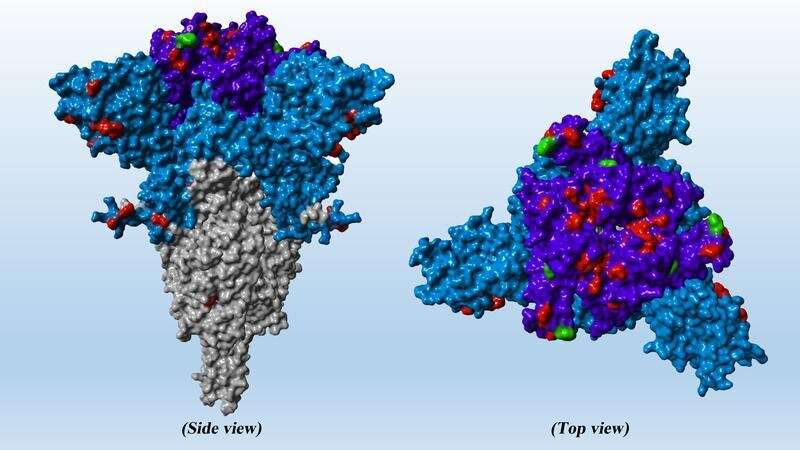The omicron subvariants BA.1 and BA.2 of SARS-CoV-2 have dominated the COVID-19 pandemic in early 2022. In many countries, these viruses are now outcompeted by emerging subvariants, with BA.5 being responsible for the current uptick of cases in Germany. However, it is at present largely unclear whether the "new" omicron subvariants BA.2.12.1, BA.4, and BA.5 acquired biological traits that allow for more efficient transmission or whether they are less efficiently blocked by antibodies compared to the "old" omicron subvariants BA.1 and BA.2.
A study by researchers at the German Primate Center (DPZ)—Leibniz Institute for Primate Research together with colleagues from Hannover Medical School and Friedrich-Alexander-University Erlangen-Nürnberg shows that most of the therapeutic antibodies available for treatment of COVID-19 patients do not inhibit BA.2.12.1, BA.4, and BA.5 at all or only inhibit with reduced potency.
The antibody Bebtelovimab constitutes the only exception, since this antibody blocked all tested variants with high efficiency. Furthermore, the study shows that the omicron subvariants BA.2.12.1 and especially BA.4 and BA.5 are inhibited worse than their predecessors BA.1 and BA.2 by antibodies generated after vaccination or inoculation followed by infection. Thus, BA.2.12.1, BA.4, and BA.5 are immune escape variants. A pass-through infection with "old" omicron subvariants confers only limited protection against infection with "new" subvariants. The research was published in The Lancet Infectious Diseases.
New SARS-CoV-2 variants emerge because of errors during viral genome replication. Thus, the virus acquires mutations that change the viral proteins, including the surface protein, spike, the central target of the antibody response. In case the mutations reduce recognition of the spike protein by antibodies, such variants become more adept at spreading among people with preexisting immunity due to vaccination or past infection.
Infection researchers at the German Primate Center specialize in the analyses of SARS-CoV-2 inhibition by antibodies. With colleagues at Hannover Medical School and Friedrich-Alexander-University Erlangen-Nürnberg, they have investigated inhibition of the SARS-CoV-2 omicron subvariants BA.2.12.1, BA.4, and BA.5 by antibodies. BA.2.12.1, BA.4, and BA.5 (the spike protein of the latter two subvariants is identical) are becoming dominant in several countries and BA.5 is largely responsible for the recent uptick of cases in Germany.
The team, including Prerna Arora, Markus Hoffmann and Stefan Pöhlmann at the German Primate Center, found that out of ten therapeutic antibodies studied only two were able to at least partially inhibit BA.2.12.1, BA.4, and BA.5 and that only one antibody, Bebtelovimab (LY-CoV1404), efficiently blocked infection by all omicron subvariants.
"These results confirm a trend that we have already seen in previous studies: omicron subvariants are not appreciably inhibited by most therapeutic antibodies and the few antibodies that inhibit frequently do so in a subvariant-specific fashion. Therefore, it is important to develop new antibodies in order be prepared for future subvariants," says Prerna Arora, first author of the study.
Antibodies from unvaccinated individuals that were infected with omicron subvariants BA.1 or BA.2 in spring 2022 neutralized BA.2.12.1 with similar efficiency but were much less potent against BA.4 and BA.5. Therefore, it is likely that a previous BA.1 or BA.2 infection provides little protection against a subsequent infection with BA.4 or BA.5.
Antibodies induced by three immunizations with the mRNA vaccine of BioNTech/Pfizer blocked all omicron subvariants. However, inhibition was less efficient as compared to that measured for a virus that circulated early during the pandemic, and inhibition of BA.2.12.1, BA.4, and BA.5 was less efficient as compared to BA.1 and BA.2. Similar results were obtained for antibodies induced upon vaccination plus breakthrough infection. Although this so-called hybrid immunity conferred overall higher neutralizing activity against all variants tested, inhibition of BA.2.12.1, BA.4 and BA.5 was significantly reduced.
"BA.2.12.1 and particularly BA.4 and BA.5 are antibody evasion variants. Vaccination will still protect against severe disease induced by these variants but protection might be somewhat less efficient as that measured for previously circulating variants," says Markus Hoffmann, senior author of the study.
"Our future studies must show whether BA.2.12.1, BA.4 and BA.5 are not only less efficiently inhibited by antibodies but are also better at infecting lung cells. If this is the case, then an uptick in hospitalizations might be the consequence, although it should be stated that this has so far not been observed in South Africa, where BA.4 and BA.5 were first detected," comments Stefan Pöhlmann, who headed the study jointly with Markus Hoffmann.
- Karlston
-

 1
1



Recommended Comments
There are no comments to display.
Join the conversation
You can post now and register later. If you have an account, sign in now to post with your account.
Note: Your post will require moderator approval before it will be visible.